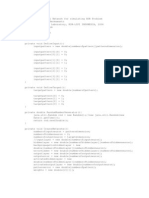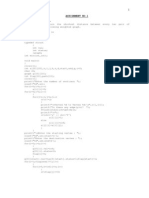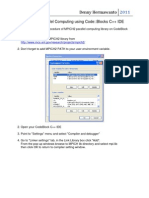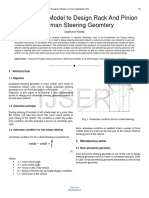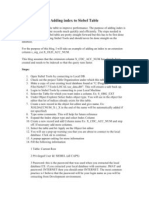Linear Vector Quantization Neural Network
Uploaded by
Denny HermawantoLinear Vector Quantization Neural Network
Uploaded by
Denny HermawantoC:\Documents and Settings\Denny Hermawanto\Desktop\code\LVQ.
java
1: /* LVQ for pattern clustering
2: * Copyright: Denny Hermawanto - 2006
3: * Mail: d_3_nny@yahoo.com
4: *
5: * Suppose we have data patterns (1;1;0;0),(0;0;0;1),(0;0;1;0),(1;1;0;0).
6: * We want to assign the patterns to two classes:
7: *
8: * Vector Class
9: * (1;1;0;0) 0
10: * (0;0;0;1) 1
11: * (0;0;1;0) 0
12: * (1;1;0;0) 0
13: */
14:
15: public class LVQ{
16:
17: private void DefineInput(){
18: inputvector = new double[numberofinput][inputdimension];
19:
20: inputvector[0][0] = 1;
21: inputvector[0][1] = 1;
22: inputvector[0][2] = 0;
23: inputvector[0][3] = 0;
24:
25: inputvector[1][0] = 0;
26: inputvector[1][1] = 0;
27: inputvector[1][2] = 0;
28: inputvector[1][3] = 1;
29:
30: inputvector[2][0] = 0;
31: inputvector[2][1] = 0;
32: inputvector[2][2] = 1;
33: inputvector[2][3] = 0;
34:
35: inputvector[3][0] = 1;
36: inputvector[3][1] = 1;
37: inputvector[3][2] = 0;
38: inputvector[3][3] = 0;
39: }
40:
41: private void DefineCluster(){
42: targetcluster = new int[numberofinput];
43: targetcluster[0] = 0;
44: targetcluster[1] = 1;
45: targetcluster[2] = 0;
46: targetcluster[3] = 0;
47: }
48:
49: private double RandomNumberGenerator(){
50: java.util.Random rnd = new java.util.Random();
51: return rnd.nextDouble();
52: }
53:
54: private double LearningRateDecay(double currentlearningrate){
55: double result = 0;
56: result = 0.8 * currentlearningrate;
57: return result;
58: }
59:
60: private void InitializeWeigths(){
61: weights = new double[numberofcluster][inputdimension];
62: for(int i=0;i<numberofcluster;i++){
63: for(int j=0;j<inputdimension;j++){
64: weights[i][j] = RandomNumberGenerator();
65: }
66: }
Print Date: 3/15/2011. Time: 9:00:37 PM 1/3
C:\Documents and Settings\Denny Hermawanto\Desktop\code\LVQ.java
67: }
68:
69: private double ComputeEuclideanDistance(double[] vector1, double[]
vector2){
70: double result;
71: double distance =0;
72: for(int j=0;j<inputdimension;j++){
73: distance += Math.pow((vector1[j] - vector2[j]), 2);
74: }
75: result = distance;
76: return result;
77: }
78:
79: private void TrainLVQ(int maxiteration){
80: euclideandistance = new double[numberofcluster];
81: System.out.print("Training LVQ");
82: for(int iter=0;iter<maxiteration;iter++){
83: for(int k=0;k<numberofinput;k++){
84: //Get the winning neuron
85: winningneuron = 0;
86: for(int i=0;i<numberofcluster;i++){
87: euclideandistance[i] =
ComputeEuclideanDistance(weights[i],inputvector[k]);
88: if(i!=0){
89:
if(euclideandistance[i]<euclideandistance[winningneuron]){
90: winningneuron = i;
91: }
92: }
93: //System.out.println(euclideandistance[i]);
94: }
95: if(targetcluster[k] == winningneuron){
96: for(int i=0;i<inputdimension;i++){
97: weights[winningneuron][i] += learnrate *
(inputvector[k][i] - weights[winningneuron][i]);
98: }
99: }
100: else{
101: for(int i=0;i<inputdimension;i++){
102: weights[winningneuron][i] =
weights[winningneuron][i] - (learnrate * (inputvector[k][i] -
weights[winningneuron][i]));
103: }
104: }
105:
106: //System.out.println("Winner:"+winningneuron);
107: //Update the winning neuron
108: }
109: learnrate = LearningRateDecay(learnrate);
110: System.out.print(".");
111: //System.out.println("Learn Rate:"+learnrate);
112: }
113: }
114:
115: private void MappingInputVector(){
116: System.out.println("\n \n"+"Mapping Input Vectors:");
117: for(int k=0;k<numberofinput;k++){
118: winningneuron = 0;
119: for(int i=0;i<numberofcluster;i++){
120: euclideandistance[i] = ComputeEuclideanDistance(weights[i],
inputvector[k]);
121: if(i!=0){
122:
if(euclideandistance[i]<euclideandistance[winningneuron]){
123: winningneuron = i;
124: }
Print Date: 3/15/2011. Time: 9:00:37 PM 2/3
C:\Documents and Settings\Denny Hermawanto\Desktop\code\LVQ.java
125: }
126: //System.out.println(euclideandistance[i]);
127: }
128: System.out.println("Input["+k+"] -> Cluster
No:"+winningneuron);
129: }
130: }
131:
132: public void RunLVQ(){
133: DefineParameters();
134: DefineInput();
135: DefineCluster();
136: InitializeWeigths();
137: TrainLVQ(50);
138: MappingInputVector();
139: }
140:
141: public void DefineParameters(){
142: numberofcluster = 2;
143: inputdimension = 4;
144: numberofinput = 4;
145: learnrate = 0.6;
146: }
147:
148: public static void main(String[] args){
149: LVQ lvq = new LVQ();
150: lvq.RunLVQ();
151: }
152:
153: //define variables
154: private double[][] inputvector;
155: private double[][] weights;
156: private double[] euclideandistance;
157: private int[] targetcluster;
158: private int numberofcluster;
159: private int inputdimension;
160: private int numberofinput;
161: private double learnrate;
162: private int winningneuron;
163: }
Print Date: 3/15/2011. Time: 9:00:37 PM 3/3
You might also like
- Pass Task 3.2: Clock: Swinburne University of Technology100% (1)Pass Task 3.2: Clock: Swinburne University of Technology12 pages
- Inverse of NXN Matrix in Java (By Augmenting The Matrix With Identity Matrix)No ratings yetInverse of NXN Matrix in Java (By Augmenting The Matrix With Identity Matrix)4 pages
- Tugas 8 Pemrograman Dasar 1: Samuel Ardiyanto 181-111-001No ratings yetTugas 8 Pemrograman Dasar 1: Samuel Ardiyanto 181-111-0014 pages
- The Final Program: Import Public Class Static New Static New in Public Static VoidNo ratings yetThe Final Program: Import Public Class Static New Static New in Public Static Void3 pages
- Pogram Metode Simplex Untuk Persoalan Maksimasi Dengan Bahasa JavaNo ratings yetPogram Metode Simplex Untuk Persoalan Maksimasi Dengan Bahasa Java4 pages
- Sum The Values On A Diagonal of A 3x3x3 MatrixNo ratings yetSum The Values On A Diagonal of A 3x3x3 Matrix5 pages
- Backpropagation Neural Network For XOR Problem Java Source Code100% (2)Backpropagation Neural Network For XOR Problem Java Source Code7 pages
- Anant Singh - 93 - Syco - JPR - Experiment 10, 14, 15 & 16No ratings yetAnant Singh - 93 - Syco - JPR - Experiment 10, 14, 15 & 1624 pages
- Java Implementation of Simple Pagerank AlgorithmNo ratings yetJava Implementation of Simple Pagerank Algorithm10 pages
- Title: K-Means Clustering Algorithm Implementation: Department of Computer Science and EngineeringNo ratings yetTitle: K-Means Clustering Algorithm Implementation: Department of Computer Science and Engineering7 pages
- Import Public Class Public Void Int Int Int Int For Int If: "Posisi Array Ke "No ratings yetImport Public Class Public Void Int Int Int Int For Int If: "Posisi Array Ke "3 pages
- #Include #Include : "Lunes" "Martes" "Miercoles" "Jueves" "Viernes" "Sabado" "Domingo"No ratings yet#Include #Include : "Lunes" "Martes" "Miercoles" "Jueves" "Viernes" "Sabado" "Domingo"4 pages
- Import Public Class Static Int Static New Public Static VoidNo ratings yetImport Public Class Static Int Static New Public Static Void2 pages
- Name - Akash Sudan Roll No. - 19115007 Subject - Cryptography and Network Security LabNo ratings yetName - Akash Sudan Roll No. - 19115007 Subject - Cryptography and Network Security Lab22 pages
- Contoh Program Fuzzy Logic Menggunakan Java60% (5)Contoh Program Fuzzy Logic Menggunakan Java10 pages
- Department of Education: Republic of The PhilippinesNo ratings yetDepartment of Education: Republic of The Philippines3 pages
- BCA - Online - Sem-V - TIME - TABLE 7 To 27 Oct 2024 LMSNo ratings yetBCA - Online - Sem-V - TIME - TABLE 7 To 27 Oct 2024 LMS4 pages
- HP LaserJet 9050 Printer Failure and Error CodesNo ratings yetHP LaserJet 9050 Printer Failure and Error Codes1 page
- Test in Empowerment Technologies SY 2019-2020 Name: Score: Grade and Section: DateNo ratings yetTest in Empowerment Technologies SY 2019-2020 Name: Score: Grade and Section: Date1 page
- Inspector General For Registration (IGR) : User Manual For Online EC ApplicationNo ratings yetInspector General For Registration (IGR) : User Manual For Online EC Application11 pages
- Ix Developer 2 20 Reference Manual MAEN831M PDFNo ratings yetIx Developer 2 20 Reference Manual MAEN831M PDF342 pages
- Muller's Method: Numerical Analysis - MTH603No ratings yetMuller's Method: Numerical Analysis - MTH6037 pages
- MyWipro Overview - Attendance Efforts LeaveNo ratings yetMyWipro Overview - Attendance Efforts Leave13 pages
- Mathematical Model To Design Rack and Pinion Ackerman Steering Geomtery100% (1)Mathematical Model To Design Rack and Pinion Ackerman Steering Geomtery5 pages
- PARAM - Wikipedia, The Free Encyclopedia PDFNo ratings yetPARAM - Wikipedia, The Free Encyclopedia PDF6 pages
- Red Hat Enterprise Linux-7-System Administrators Guide-en-US PDFNo ratings yetRed Hat Enterprise Linux-7-System Administrators Guide-en-US PDF569 pages
- 18.330 Lecture Notes: Integration of Ordinary Differential EquationsNo ratings yet18.330 Lecture Notes: Integration of Ordinary Differential Equations24 pages
- Instruction List Programming: PLC Il - 18.1No ratings yetInstruction List Programming: PLC Il - 18.110 pages
- ECE232: Hardware Organization and Design: MULTIPLY (Unsigned)No ratings yetECE232: Hardware Organization and Design: MULTIPLY (Unsigned)18 pages
- Syllabus Ideas For A 15-Week Digital Entrepreneurship CourseNo ratings yetSyllabus Ideas For A 15-Week Digital Entrepreneurship Course6 pages



























